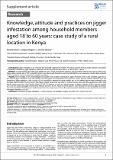Knowledge, Attitude and Practices on Jigger Infestation Among Household Members Aged 18 to 60 Years
Publication Date
12/25/2012Type
Article, Journalviews
downloads
Metadata
Show full item recordCitation
Bernard Kimani, Josephat Nyagero, Lawrence Ikamari. Knowledge, attitude and practices on jigger infestation among household members aged 18 to 60 years: case study of a rural location in Kenya. Pan Afr Med J. 2012;13(Supp 1):7
Abstract/
Introduction: Jigger infestation is an important but neglected public health problem. The study assessed the knowledge, attitude and practices of household members on jigger infestation, practices and control within Murang’a district, a rural location in Kenya. Methods: A cross-sectional descriptive study design was used. Structured interview schedules and observation checklist were used to collect quantitative data. A sample size of 271 household members was interviewed. Descriptive and inferential statistics were analyzed and odds ratios computed at 95% confidence interval to determine variables association. Results: On knowledge, 70.1% acknowledged poor hygiene and sanitation contributes to jigger infestation while 16.6% identified jigger flea as the cause of jigger infestation. Over half (53.9%) reported jiggers are transmissible from person to person. Majority (94.8%) identified signs and symptoms of jigger infestation. Over a quarter (23.6%) reported an infested household member and 18.8% infested persons were confirmed during the study. Many (59.8%) held the opinion that, jigger infested persons are lazy, 26.2% reported they are poor and 12% reported they either have specific blood or are from certain families. Below half (48.7%) believed in myths and misconceptions on jiggers. Majority (90.8%) reported needles/ pins were the mostly used jigger removal items followed by thorns 38.7%. About two thirds (62.0%) were not aware of communal jigger prevention and control activities. The Chi-square results showed that, the village, type of house floor and compound maintenance were significantly associated with jigger infestation (p<0.05). Conclusion: Knowledge on jigger infestation is high but this has not translated to jigger prevention and control in the area.
Further Details
This article is published as part of the supplement “AMREF´s evidence in advancing the health of women and children” Supplement sponsored by AMREF - African Medical and Research Foundation © Bernard Kimani et al. The Pan African Medical Journal - ISSN 1937-8688. This is an Open Access article distributed under the terms of the Creative Commons Attribution License (http://creativecommons.org/licenses/by/2.0), which permits unrestricted use, distribution, and reproduction in any medium, provided the original work is properly cited.
Publisher
Pan African Medical JournalISSN
1937-8688Collections
- General - GEN [367]

